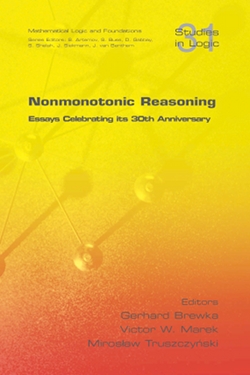 | Nonmonotonic Reasoning
Essays Celebrating its 30th Anniversary
Gerhard Brewka, Victor W. Marek, and Miroslaw Truszczynski, eds.
The publication of the seminal special issue on nonmonotonic logics by the Artificial Intelligence Journal in 1980 resulted in a new area of research in knowledge representation and changed the mainstream paradigm of logic that originated in antiquity. It led to discoveries of connections between logic, knowledge representation and computation, and attracted not only computer scientists but also logicians, mathematicians and philosophers.
Nonmonotonic reasoning concerns situations when information is incomplete or uncertain. Thus, conclusions drawn lack iron-clad certainty that comes with classical logic reasoning. New information, even if the original one is retained, may change conclusions. Formal ways to capture mechanisms involved in nonmonotonic reasoning, and to exploit them for computation as in the answer set programming paradigm are at the heart of this research area.
The conference NonMon@30 - Thirty Years of Nonmonotonic Reasoning, held in Lexington, KY, USA, October 22-25, 2010, aimed to sum up the experience of the first 30 years of nonmonotonic logics and to map paths into the future. It comprised eighteen invited talks and several technical presentations. The present volume consists of the texts based on twelve of the invited presentations. These papers offer unique insights into the key questions that have been driving the development of nonmonotonic reasoning and suggest problems worthy of consideration in the future. They paint the picture of the field that has a well-established tradition, and remains vibrant and relevant to long-term goals of artificial intelligence.
July 2011
978-1-84890-042-4
Buy from Amazon: UK US
|

